新概念英语第三册 Lesson 4 The double life of Alfred Bloggs 课件 (共47张PPT,含内嵌音频)
文档属性
| 名称 | 新概念英语第三册 Lesson 4 The double life of Alfred Bloggs 课件 (共47张PPT,含内嵌音频) | 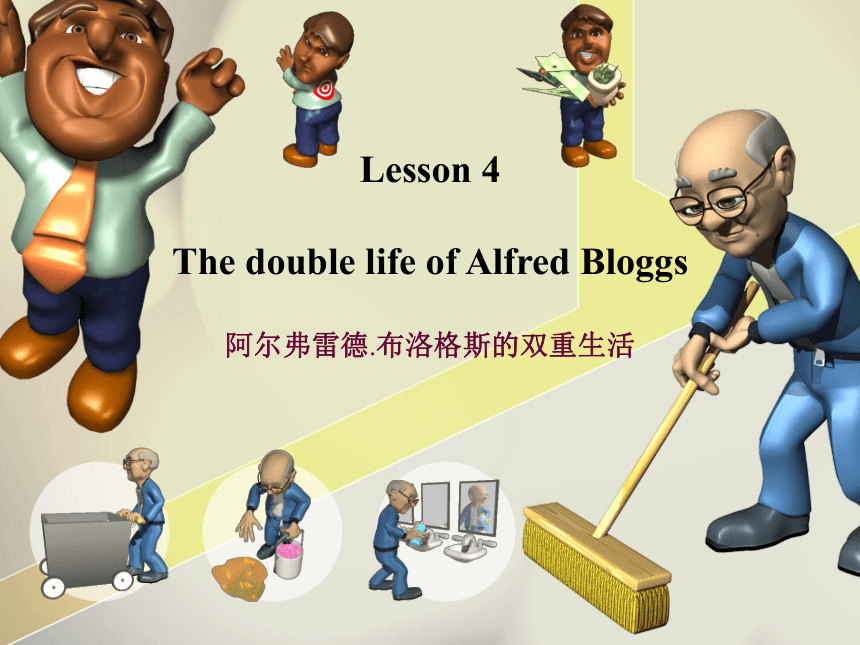 | |
| 格式 | pptx | ||
| 文件大小 | 6.2MB | ||
| 资源类型 | 教案 | ||
| 版本资源 | 新概念英语 | ||
| 科目 | 英语 | ||
| 更新时间 | 2024-12-05 19:28:23 | ||
图片预览






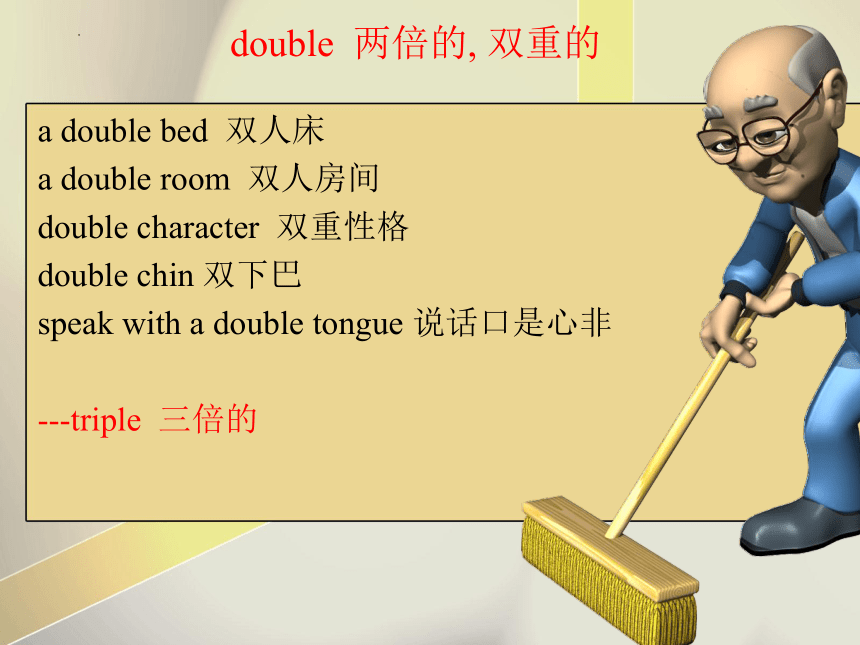
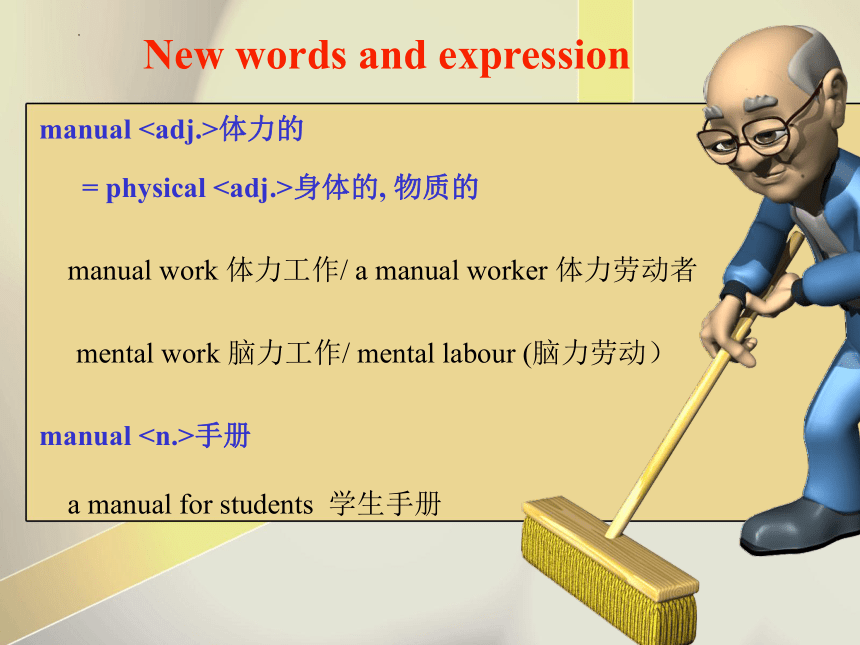
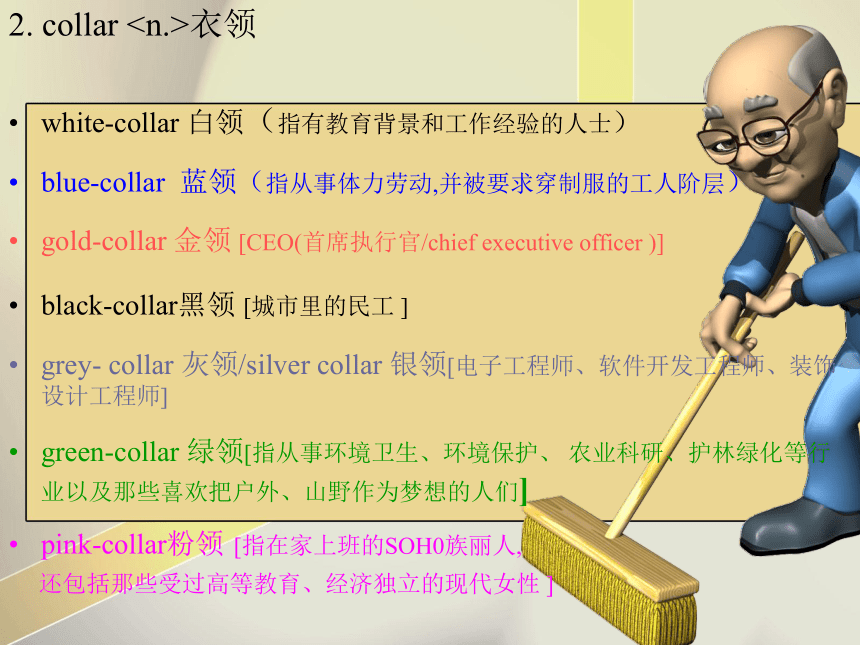
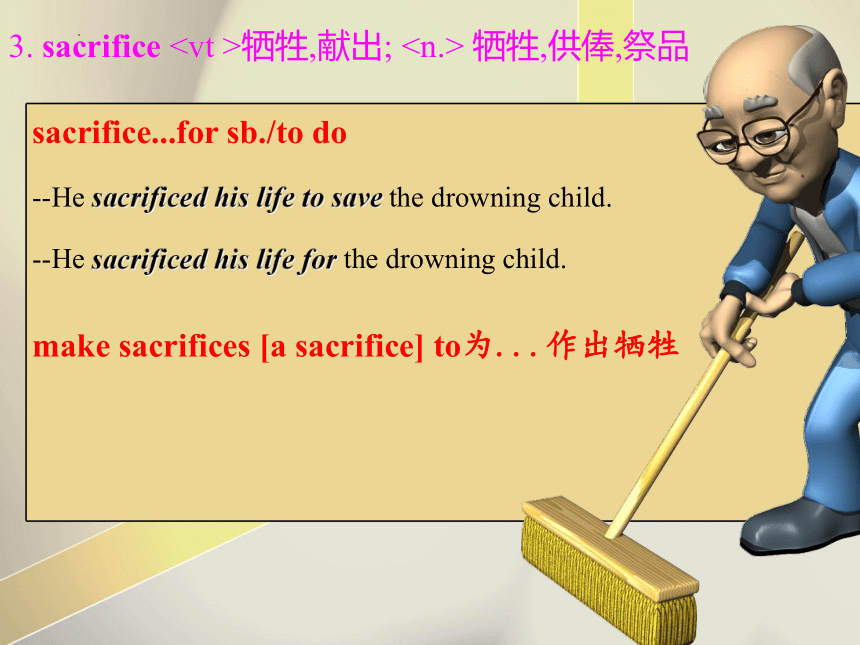
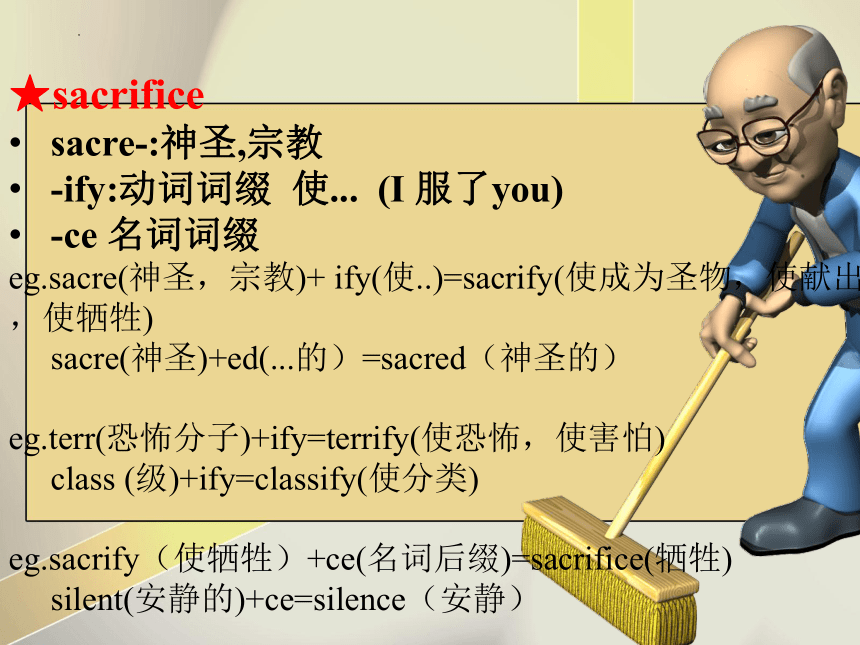
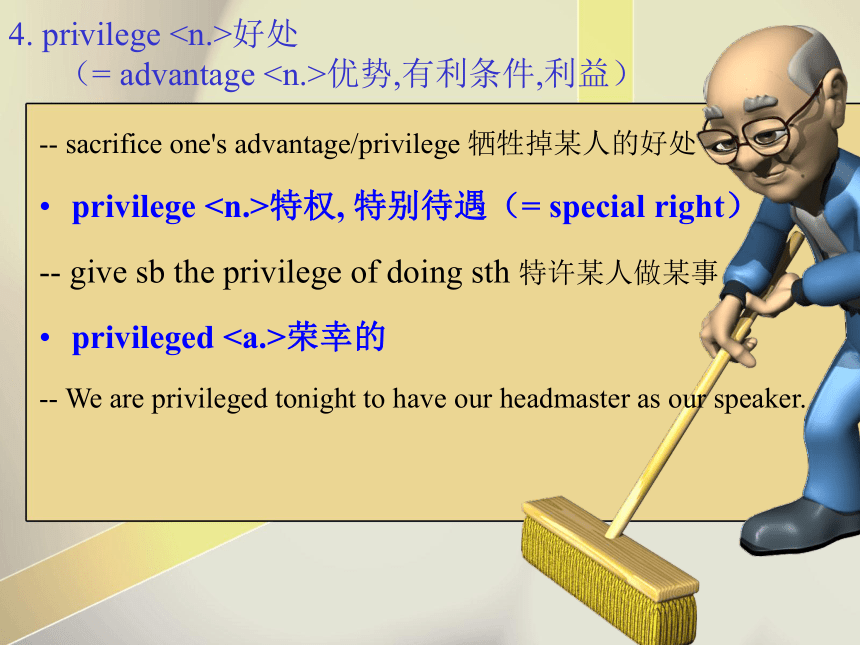
文档简介
(共47张PPT)
Lesson 4
The double life of Alfred Bloggs
阿尔弗雷德.布洛格斯的双重生活
White-collar workers
blue-collar workers
baker
cook
electrician
bus driver
carpenter
mechanic
painter
plumber
tailor
engineer
architect
chemist
Some other occupations
New Words:
词根词缀分析记忆法 ---派生词
词根(root)决定词基本义
前缀(prefix)改变词义
后缀(suffix)改变词性
double 两倍的, 双重的
a double bed 双人床
a double room 双人房间
double character 双重性格
double chin 双下巴
speak with a double tongue 说话口是心非
---triple 三倍的
New words and expression
manual体力的
= physical身体的, 物质的
manual work 体力工作/ a manual worker 体力劳动者
mental work 脑力工作/ mental labour (脑力劳动)
manual手册
a manual for students 学生手册
2. collar衣领
white-collar 白领(指有教育背景和工作经验的人士)
blue-collar 蓝领(指从事体力劳动,并被要求穿制服的工人阶层)
gold-collar 金领 [CEO(首席执行官/chief executive officer )]
black-collar黑领 [城市里的民工 ]
grey- collar 灰领/silver collar 银领[电子工程师、软件开发工程师、装饰设计工程师]
green-collar 绿领[指从事环境卫生、环境保护、 农业科研、护林绿化等行业以及那些喜欢把户外、山野作为梦想的人们]
pink-collar粉领 [指在家上班的SOH0族丽人,
还包括那些受过高等教育、经济独立的现代女性 ]
3. sacrifice牺牲,献出; 牺牲,供俸,祭品
sacrifice...for sb./to do
--He sacrificed his life to save the drowning child.
--He sacrificed his life for the drowning child.
make sacrifices [a sacrifice] to为...作出牺牲
★sacrifice
sacre-:神圣,宗教
-ify:动词词缀 使... (I 服了you)
-ce 名词词缀
eg.sacre(神圣,宗教)+ ify(使..)=sacrify(使成为圣物,使献出,使牺牲)
sacre(神圣)+ed(...的)=sacred(神圣的)
eg.terr(恐怖分子)+ify=terrify(使恐怖,使害怕)
class (级)+ify=classify(使分类)
eg.sacrify(使牺牲)+ce(名词后缀)=sacrifice(牺牲)
silent(安静的)+ce=silence(安静)
4. privilege好处
(= advantage优势,有利条件,利益)
-- sacrifice one's advantage/privilege 牺牲掉某人的好处
privilege特权, 特别待遇(= special right)
-- give sb the privilege of doing sth 特许某人做某事
privileged荣幸的
-- We are privileged tonight to have our headmaster as our speaker.
★privilege n. 特权,好处
privi:私人
privi(私人)+ate(有..性质的)=private(私有的)
leg:法律
leg+ist=legist(法律学家)
legislate 立法
so:
privi(私人)+leg(e)(法律)=privilege(私人的法律即特权,因特权会产生好处)
grant sb. the privilege of doing sth.
赋予某人做某事的特权
It is a great ~ to know you.
认识您非常荣幸!
5. secret秘密 秘密的, 隐秘的
keep secret 保密
It's between you and me. 此事只介于你我之间。
I'll keep it to myself. 我会保守秘密的。
in secret 私下里(= secretly, in private, privately)
-- I was told about it in secret.
in the secret 知道内情
-- He was in the secret from the beginning
★corporation n 团体,社团,公司
corpor:body 体
eg.
corpor(体-团体)+ate(有...性质的)=corporate(团体的、
社团的)
corporate+tion(名词后缀)=(团体、社团、公司)
multinational corporations.
跨国公司
Text逐句分析
questions
Who generally earn more, manual worker or office worker
People who work with their hands often earn more than office workers, don’t they
How do we often refer to office workers
Why do we call office workers “white-collar” workers
What are some people prepared to sacrifice to be white collar workers
What was Alfred’s job at the Ellesmere Corporation
Was Alf married
What did Alf fail to tell his wife
How did he dress every morning
What did he change into when he got to wok
How did he spend the next eight hours
What did he do before going home
How long did Alf do this
Did his fellow dustmen keep his secret
Did Alf’s wife discover his secret
Will she ever discover it
Where will Alf soon being working
How will his salary compare with his work as a dustman
How does he feel about the loss of money
What will he now be wearing every day
How will people address him
These days, people who do manual work often receive far more money than people who work in offices.
far more和much more, even more, still more 等一样,
可修饰形容词和副词,表示“更加”。
e.g. This TV set is much more expensive.
He worked much more carefully on the new design.
在这项新的设计上,他工作努力得多了。
A bicycle's often far more convenient than a car in busy cities.
People who work in offices are frequently referred to as ‘white-collar workers' for the simple reason that they usually wear a collar and tie to go to work.
refer to...as 把...看作为
= regard...as = think of...as = view... as ...
-- I always refer to him as bookworm(n.书呆子)
for the simple reason = for 引导的原因状语从句
-- He is refer to as a bookworm for the simple reason that
he is always reading.
-- 他被送到了监狱,是因为他杀了人。
Such is human nature, that a great many people are often willing to sacrifice higher pay for the privilege of becoming white-collar workers.
such...that... (that引导同位语从句, 进一步补充说明
such的基本内涵, Such用于倒装形式 增强感彩)
-- His kindness was such that we will never forget him.
= Such was his kindness that… (such在句首要倒装)
= He was so kind that we will never forget him.
这里的such...that...中,such 是主语,that引导同位语从句,进一步补充说明such的基本内涵
Such is human nature that we want to get a lot of things free.
重点句型2:倒装句(部分倒装)
be willing to do sth情愿做..
=be prepared to do sth /be ready to do sth
I don't know whether he is willing to come.
willingness(n)愿意 自发 积极
be unwilling to do sth不情愿做
=be reluctant to do sth (adj)
This can give rise to curious situations, as it did in the case of Alfred Bloggs who worked as a dustman for the Ellesmere Corporation.
give rise to =(lead to导致, 通向)
=(cause引起, 惹起)
=(result in导致)
e.g. Such behavior may give rise to misunderstandings.
The bad conditions have given rise to a lot of crimes.
不良的环境引起了犯罪。
她的话引起了我们的争吵。
in the case of 就...来说, 关于, 在…的情况下
= concerning关于, 涉及, 就...说
e.g. Stealing is no shame in the case of him.
偷窃对他来说不是一件可耻的事。
in case of(副词)万一, 以防 (in case万一)
e.g. You should ensure your house in case of fire.
Take umbrella in case of rain.
When he got married, Alf was too embarrassed to say anything to his wife about his job.
be embarrassed 尴尬的
embarrass (v)
embarrassed (adj)
embarrassing (adj)
embarrassment (n)
He simply told her that he worked for the Corporation.
Every morning, he left home dressed in a smart
black suit.
be dressed in 穿着~
dress oneself
dress sb 给某人穿衣服
The boy is too young to dress himself.
He then changed into overalls and spent the next eight hours as a dustman.
Before returning home at night. He took a shower
and changed back into his suit.
7. Before returning home at night, he took a shower and changed back into his suit.
Before returning home=Before he returned home
在before引导的时间状语从句中,return的逻辑主语和主句的主语he是保持一致的,所以这个时间状语是由介词before和动名词搭配而成,相当于before引导的时间状语从句。
如果运用动名词形式,动名词的逻辑主语必须是主句的主语。
After getting home, he had a good rest.
=After he got home, he had a good rest.
Before having dinner, he finished all his homework.
=
Alf did this for over two years and his fellow dustmen kept his secret.
fellow workers. 同事 / fellow students 同学
town fellow 老乡/ fellow citizens 市民
keep the secret / 保守秘密
reveal a secret 泄密
break one’s promise 失信
eat one’s words 食言
take back one’s words 收回说的话
Alf's wife has never discovered that she married a dustman and she never will, for Alf has just found another job.
she never will
= she will never discover the secret
在省略句式中, never要放在助动词之前
-- “will you go to see her ”
-- “I will never go to see her" = "No, I never will."
He will soon be working in an office.
will soon be working 表将要持续下去的动作
He will be earning only half as much as he used to,
but he feels that his rise in status is well worth the
loss of money.
will be earning 表将要持续下去的动作
From now on, he will wear a suit all day and others will call him 'Mr. Bloggs', not 'Alf'.
expressions
把… 称为
refer to… as
愿意
be willing to do
为…牺牲
sacrifice… for
引起,造成
give rise to
就…而言
in the case of
换上(衣服)
change into
保守秘密
keep one’s secret
由于,因为
for the reason that
要点回顾
1. 倒装句
2. sb be frequently referred to as … for the simple reason that…
3. collar culture in western countries.
4. manu-
5. 倍数表示法
6. 借代修辞( metonymy)
These days, people who...than... receive $ people who ...
People who... white-collar for the simple reason that....
Such is..., that.....sacrifice...becoming white-collar workers
This can....,as it...Alfred Bloggs...for the Ellesmere Corporation.
Retelling
When he ..., Alf...to his wife....
He simply...the Corporation
Everying morning, he....
He then...and ...as a dustman.
Before ..., he...and... into his suit.
Alf did this for...and his fellow...
Alf’s wife...that she...and she never...,for...
He will soon....He will be...,but he...
From now on, he will...and others will...
Vocabulary
Receive—get
Sacrifice—give up
Privilege—special advantage, honour
Curious—strange
embarrassed—shy
Discovered—found out
Status—social position
III、 Grammar part 1
He will soon be working in an office. 他不久就要坐在办公室里工作了。
“will be doing” 为将来进行时,它的基本用法是表示在将来某一时间正在进行的动作。这个时态一般不表示意愿,常表示计划或安排好的事情。
What will be doing this time tomorrow?你明天这个时候要干嘛?
I’ll be taking my holidays soon. 我不久将去度假去了。
III、 Grammar part 2
将来进行时表示将来时还有以下一些情况:
(1)将来进行时常表示事情的正常发展。
——would it be any trouble for you to post this letter
给我邮寄一下这封信对你方便吗?
——no, not at all. I’ll be going out presently.
方便,反正我正要出去。
(2)表原因,结果和可能
Please come tomorrow afternoon. Tomorrow morning I’ll be having a meeting. 请你明天下午来,明天上午我有一个约会。(表原因)
If you don’t write, they will be wondering what has happened to you.
你若不写信,他们就回想你出了什么事,(表结果)
The roses will be coming out soon.
玫瑰花很快就会开放。(表可能)
III、 Grammar part 3
现在完成时和现在完成进行时的区别:
1。概念:
2. 结构:
3. 时间状语词:
相同点:
不同点:
III、 Grammar part 3
现在完成时和现在完成进行时的区别:
1。概念:
2. 结构:
3. 时间状语词:
相同点:
不同点:
Iv Exercises 1
1.A illustrate vt.阐明, 阐述
2.C double life
3.D "...he feels that his rise in status is well worth the loss of money"
previous adj.在前的, 早先的 respect n.某方面 vt.尊敬, 尊重
4.B to go 可以省略
They usually go to work wearing a collar and tie.
5.D "Alfred was too embarrassed to say anything to his wife about his job." too...to…(不定式to表示否定) so...that…(在that引导的结果状语从句中, 如果采用否定式,可以和too...to互换)
Eg: The water is too hot for us to drink. = The water is so hot that we can‘t drink.
Iv Exercises 2
6.C "He simply told her that he worker of the Corporation"
simply副词(仅仅是, 再没有别的了= only, just)
无论是simply, only还是just,往往用在所修饰的主体词之前。A项中“简单的”
I did it simply/only for the money
I don‘t like driving. I do it simply/only because I have to go to work each day.
And no more(放句尾)“再没告诉他别的”
in a simple way 简单地, 简朴地
She was always dressed in a simple way.
D项中only 用来修饰“worked”“他告诉她他只为那家公司工作”
意思不符合题意。
Iv Exercises 3
7.B Before是介词和动名词形式搭配,Before returning home...
Before是连接词,引导时间状语从句, Before he returned home...before引导的从句, 常用一般现在时或一般过去时, 不用进行时。
8 C "half as much as it used to be"
the amount要用定语从句进行限定
当主句的谓语动词是行为动词时,used to之后的动词必须省略掉
当主句的谓语动词是系动词时,used to之后必须带有系动词be,且不能省.
-- I feel the summers are hotter than they used to be.
-- I feel you are much fatter than you used to be.
9. D gain:获利, 赢得(表示通过努力)
-- gain time, gain reputation, gain speed, gain height
fee:(为专业服务支付的)费用
doctor’s fees 医疗费 / the lawyer’s fees 律师费-- pay for my university fees 支付我的大学学费
payment:(商业、信贷)支付的款项(非常正式)
wages:(体力劳动者的)工资
salary:(白领的)薪水
10. B companion n.同伴, 共事者
comrade n.朋友, 同志, 伙伴特指那些能同甘共苦的人。
11.C “well worth the loss of money ” ;Pay back 偿还, 报复 reward 酬劳 value 价值 compensate v.偿还, 补偿 Compensate for赔偿 = make up for弥补
His intelligence more than compensate for his lack of experience.
12... A call = addressed as被称为name命名 / cry out喊叫 / shout v.呼喊, 呼叫
Iv Exercises 4
谢 谢
Lesson 4
The double life of Alfred Bloggs
阿尔弗雷德.布洛格斯的双重生活
White-collar workers
blue-collar workers
baker
cook
electrician
bus driver
carpenter
mechanic
painter
plumber
tailor
engineer
architect
chemist
Some other occupations
New Words:
词根词缀分析记忆法 ---派生词
词根(root)决定词基本义
前缀(prefix)改变词义
后缀(suffix)改变词性
double 两倍的, 双重的
a double bed 双人床
a double room 双人房间
double character 双重性格
double chin 双下巴
speak with a double tongue 说话口是心非
---triple 三倍的
New words and expression
manual
= physical
manual work 体力工作/ a manual worker 体力劳动者
mental work 脑力工作/ mental labour (脑力劳动)
manual
a manual for students 学生手册
2. collar
white-collar 白领(指有教育背景和工作经验的人士)
blue-collar 蓝领(指从事体力劳动,并被要求穿制服的工人阶层)
gold-collar 金领 [CEO(首席执行官/chief executive officer )]
black-collar黑领 [城市里的民工 ]
grey- collar 灰领/silver collar 银领[电子工程师、软件开发工程师、装饰设计工程师]
green-collar 绿领[指从事环境卫生、环境保护、 农业科研、护林绿化等行业以及那些喜欢把户外、山野作为梦想的人们]
pink-collar粉领 [指在家上班的SOH0族丽人,
还包括那些受过高等教育、经济独立的现代女性 ]
3. sacrifice
sacrifice...for sb./to do
--He sacrificed his life to save the drowning child.
--He sacrificed his life for the drowning child.
make sacrifices [a sacrifice] to为...作出牺牲
★sacrifice
sacre-:神圣,宗教
-ify:动词词缀 使... (I 服了you)
-ce 名词词缀
eg.sacre(神圣,宗教)+ ify(使..)=sacrify(使成为圣物,使献出,使牺牲)
sacre(神圣)+ed(...的)=sacred(神圣的)
eg.terr(恐怖分子)+ify=terrify(使恐怖,使害怕)
class (级)+ify=classify(使分类)
eg.sacrify(使牺牲)+ce(名词后缀)=sacrifice(牺牲)
silent(安静的)+ce=silence(安静)
4. privilege
(= advantage
-- sacrifice one's advantage/privilege 牺牲掉某人的好处
privilege
-- give sb the privilege of doing sth 特许某人做某事
privileged
-- We are privileged tonight to have our headmaster as our speaker.
★privilege n. 特权,好处
privi:私人
privi(私人)+ate(有..性质的)=private(私有的)
leg:法律
leg+ist=legist(法律学家)
legislate 立法
so:
privi(私人)+leg(e)(法律)=privilege(私人的法律即特权,因特权会产生好处)
grant sb. the privilege of doing sth.
赋予某人做某事的特权
It is a great ~ to know you.
认识您非常荣幸!
5. secret
keep secret 保密
It's between you and me. 此事只介于你我之间。
I'll keep it to myself. 我会保守秘密的。
in secret 私下里(= secretly, in private, privately)
-- I was told about it in secret.
in the secret 知道内情
-- He was in the secret from the beginning
★corporation n 团体,社团,公司
corpor:body 体
eg.
corpor(体-团体)+ate(有...性质的)=corporate(团体的、
社团的)
corporate+tion(名词后缀)=(团体、社团、公司)
multinational corporations.
跨国公司
Text逐句分析
questions
Who generally earn more, manual worker or office worker
People who work with their hands often earn more than office workers, don’t they
How do we often refer to office workers
Why do we call office workers “white-collar” workers
What are some people prepared to sacrifice to be white collar workers
What was Alfred’s job at the Ellesmere Corporation
Was Alf married
What did Alf fail to tell his wife
How did he dress every morning
What did he change into when he got to wok
How did he spend the next eight hours
What did he do before going home
How long did Alf do this
Did his fellow dustmen keep his secret
Did Alf’s wife discover his secret
Will she ever discover it
Where will Alf soon being working
How will his salary compare with his work as a dustman
How does he feel about the loss of money
What will he now be wearing every day
How will people address him
These days, people who do manual work often receive far more money than people who work in offices.
far more和much more, even more, still more 等一样,
可修饰形容词和副词,表示“更加”。
e.g. This TV set is much more expensive.
He worked much more carefully on the new design.
在这项新的设计上,他工作努力得多了。
A bicycle's often far more convenient than a car in busy cities.
People who work in offices are frequently referred to as ‘white-collar workers' for the simple reason that they usually wear a collar and tie to go to work.
refer to...as 把...看作为
= regard...as = think of...as = view... as ...
-- I always refer to him as bookworm(n.书呆子)
for the simple reason = for 引导的原因状语从句
-- He is refer to as a bookworm for the simple reason that
he is always reading.
-- 他被送到了监狱,是因为他杀了人。
Such is human nature, that a great many people are often willing to sacrifice higher pay for the privilege of becoming white-collar workers.
such...that... (that引导同位语从句, 进一步补充说明
such的基本内涵, Such用于倒装形式 增强感彩)
-- His kindness was such that we will never forget him.
= Such was his kindness that… (such在句首要倒装)
= He was so kind that we will never forget him.
这里的such...that...中,such 是主语,that引导同位语从句,进一步补充说明such的基本内涵
Such is human nature that we want to get a lot of things free.
重点句型2:倒装句(部分倒装)
be willing to do sth情愿做..
=be prepared to do sth /be ready to do sth
I don't know whether he is willing to come.
willingness(n)愿意 自发 积极
be unwilling to do sth不情愿做
=be reluctant to do sth (adj)
This can give rise to curious situations, as it did in the case of Alfred Bloggs who worked as a dustman for the Ellesmere Corporation.
give rise to =(lead to
=(cause
=(result in
e.g. Such behavior may give rise to misunderstandings.
The bad conditions have given rise to a lot of crimes.
不良的环境引起了犯罪。
她的话引起了我们的争吵。
in the case of 就...来说, 关于, 在…的情况下
= concerning
e.g. Stealing is no shame in the case of him.
偷窃对他来说不是一件可耻的事。
in case of(副词)万一, 以防 (in case
e.g. You should ensure your house in case of fire.
Take umbrella in case of rain.
When he got married, Alf was too embarrassed to say anything to his wife about his job.
be embarrassed 尴尬的
embarrass (v)
embarrassed (adj)
embarrassing (adj)
embarrassment (n)
He simply told her that he worked for the Corporation.
Every morning, he left home dressed in a smart
black suit.
be dressed in 穿着~
dress oneself
dress sb 给某人穿衣服
The boy is too young to dress himself.
He then changed into overalls and spent the next eight hours as a dustman.
Before returning home at night. He took a shower
and changed back into his suit.
7. Before returning home at night, he took a shower and changed back into his suit.
Before returning home=Before he returned home
在before引导的时间状语从句中,return的逻辑主语和主句的主语he是保持一致的,所以这个时间状语是由介词before和动名词搭配而成,相当于before引导的时间状语从句。
如果运用动名词形式,动名词的逻辑主语必须是主句的主语。
After getting home, he had a good rest.
=After he got home, he had a good rest.
Before having dinner, he finished all his homework.
=
Alf did this for over two years and his fellow dustmen kept his secret.
fellow workers. 同事 / fellow students 同学
town fellow 老乡/ fellow citizens 市民
keep the secret / 保守秘密
reveal a secret 泄密
break one’s promise 失信
eat one’s words 食言
take back one’s words 收回说的话
Alf's wife has never discovered that she married a dustman and she never will, for Alf has just found another job.
she never will
= she will never discover the secret
在省略句式中, never要放在助动词之前
-- “will you go to see her ”
-- “I will never go to see her" = "No, I never will."
He will soon be working in an office.
will soon be working 表将要持续下去的动作
He will be earning only half as much as he used to,
but he feels that his rise in status is well worth the
loss of money.
will be earning 表将要持续下去的动作
From now on, he will wear a suit all day and others will call him 'Mr. Bloggs', not 'Alf'.
expressions
把… 称为
refer to… as
愿意
be willing to do
为…牺牲
sacrifice… for
引起,造成
give rise to
就…而言
in the case of
换上(衣服)
change into
保守秘密
keep one’s secret
由于,因为
for the reason that
要点回顾
1. 倒装句
2. sb be frequently referred to as … for the simple reason that…
3. collar culture in western countries.
4. manu-
5. 倍数表示法
6. 借代修辞( metonymy)
These days, people who...than... receive $ people who ...
People who... white-collar for the simple reason that....
Such is..., that.....sacrifice...becoming white-collar workers
This can....,as it...Alfred Bloggs...for the Ellesmere Corporation.
Retelling
When he ..., Alf...to his wife....
He simply...the Corporation
Everying morning, he....
He then...and ...as a dustman.
Before ..., he...and... into his suit.
Alf did this for...and his fellow...
Alf’s wife...that she...and she never...,for...
He will soon....He will be...,but he...
From now on, he will...and others will...
Vocabulary
Receive—get
Sacrifice—give up
Privilege—special advantage, honour
Curious—strange
embarrassed—shy
Discovered—found out
Status—social position
III、 Grammar part 1
He will soon be working in an office. 他不久就要坐在办公室里工作了。
“will be doing” 为将来进行时,它的基本用法是表示在将来某一时间正在进行的动作。这个时态一般不表示意愿,常表示计划或安排好的事情。
What will be doing this time tomorrow?你明天这个时候要干嘛?
I’ll be taking my holidays soon. 我不久将去度假去了。
III、 Grammar part 2
将来进行时表示将来时还有以下一些情况:
(1)将来进行时常表示事情的正常发展。
——would it be any trouble for you to post this letter
给我邮寄一下这封信对你方便吗?
——no, not at all. I’ll be going out presently.
方便,反正我正要出去。
(2)表原因,结果和可能
Please come tomorrow afternoon. Tomorrow morning I’ll be having a meeting. 请你明天下午来,明天上午我有一个约会。(表原因)
If you don’t write, they will be wondering what has happened to you.
你若不写信,他们就回想你出了什么事,(表结果)
The roses will be coming out soon.
玫瑰花很快就会开放。(表可能)
III、 Grammar part 3
现在完成时和现在完成进行时的区别:
1。概念:
2. 结构:
3. 时间状语词:
相同点:
不同点:
III、 Grammar part 3
现在完成时和现在完成进行时的区别:
1。概念:
2. 结构:
3. 时间状语词:
相同点:
不同点:
Iv Exercises 1
1.A illustrate vt.阐明, 阐述
2.C double life
3.D "...he feels that his rise in status is well worth the loss of money"
previous adj.在前的, 早先的 respect n.某方面 vt.尊敬, 尊重
4.B to go 可以省略
They usually go to work wearing a collar and tie.
5.D "Alfred was too embarrassed to say anything to his wife about his job." too...to…(不定式to表示否定) so...that…(在that引导的结果状语从句中, 如果采用否定式,可以和too...to互换)
Eg: The water is too hot for us to drink. = The water is so hot that we can‘t drink.
Iv Exercises 2
6.C "He simply told her that he worker of the Corporation"
simply副词(仅仅是, 再没有别的了= only, just)
无论是simply, only还是just,往往用在所修饰的主体词之前。A项中“简单的”
I did it simply/only for the money
I don‘t like driving. I do it simply/only because I have to go to work each day.
And no more(放句尾)“再没告诉他别的”
in a simple way 简单地, 简朴地
She was always dressed in a simple way.
D项中only 用来修饰“worked”“他告诉她他只为那家公司工作”
意思不符合题意。
Iv Exercises 3
7.B Before是介词和动名词形式搭配,Before returning home...
Before是连接词,引导时间状语从句, Before he returned home...before引导的从句, 常用一般现在时或一般过去时, 不用进行时。
8 C "half as much as it used to be"
the amount要用定语从句进行限定
当主句的谓语动词是行为动词时,used to之后的动词必须省略掉
当主句的谓语动词是系动词时,used to之后必须带有系动词be,且不能省.
-- I feel the summers are hotter than they used to be.
-- I feel you are much fatter than you used to be.
9. D gain:获利, 赢得(表示通过努力)
-- gain time, gain reputation, gain speed, gain height
fee:(为专业服务支付的)费用
doctor’s fees 医疗费 / the lawyer’s fees 律师费-- pay for my university fees 支付我的大学学费
payment:(商业、信贷)支付的款项(非常正式)
wages:(体力劳动者的)工资
salary:(白领的)薪水
10. B companion n.同伴, 共事者
comrade n.朋友, 同志, 伙伴特指那些能同甘共苦的人。
11.C “well worth the loss of money ” ;Pay back 偿还, 报复 reward 酬劳 value 价值 compensate v.偿还, 补偿 Compensate for赔偿 = make up for弥补
His intelligence more than compensate for his lack of experience.
12... A call = addressed as被称为name命名 / cry out喊叫 / shout v.呼喊, 呼叫
Iv Exercises 4
谢 谢
同课章节目录
